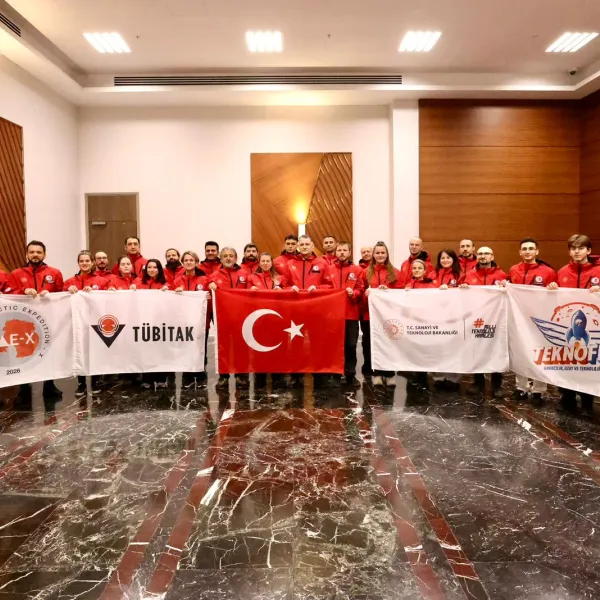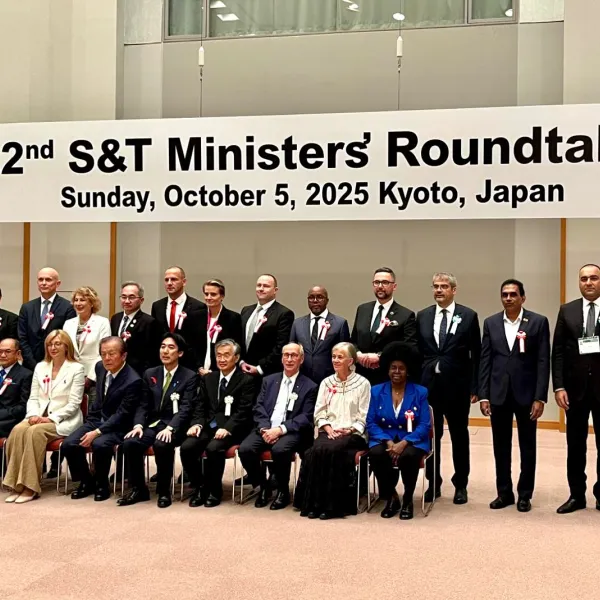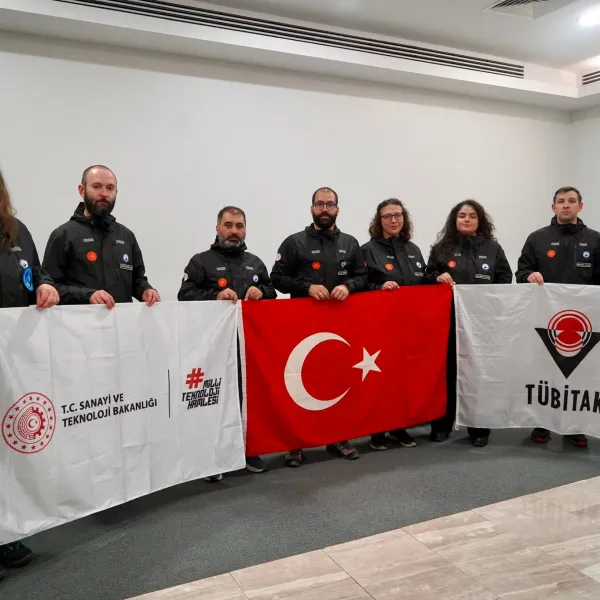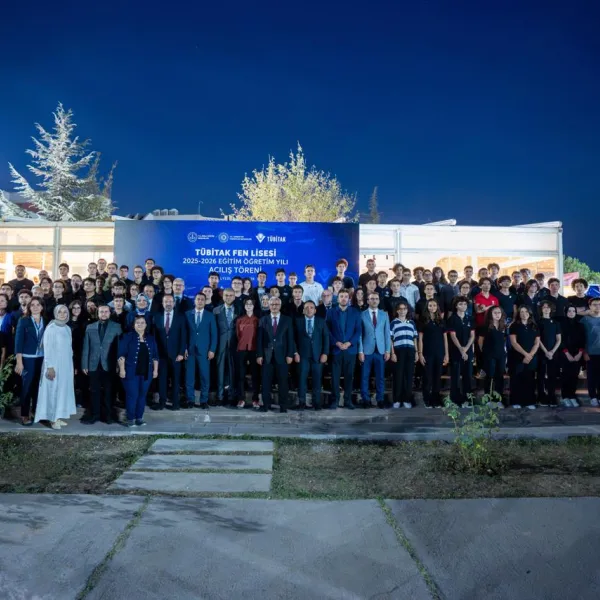
The Scientific and Technological Research Council of Türkiye (TÜBİTAK) organized an online seminar on Earth Science Studies after the February 6 Kahramanmaraş Earthquakes. TÜBİTAK President Prof. Dr. Hasan Mandal delivered the opening speech at the seminar. Dokuz Eylül University, Earthquake Research and Application Center (DAUM) Director Assoc. Prof. Dr. Ökmen Sümer, TÜBİTAK MAM Climate Change and Sustainability Vice Presidency, Earth Sciences Research Group's Assoc. Prof. Dr. Mehmet Ergin, and Aylin Karaaslan, M.S. presented earthquake studies under the moderation of Dr. Adil Tarancıoğlu.
Prof. Dr. Hasan Mandal, President of TÜBİTAK, made a presentation titled "Working Together and Achieving Together Against Natural Disasters with a Focus on Science".
Speaking about Global Risks Assessments and the Increasing Necessity of Solution Orientation, Mandal said: "While the top priority global risks that require solutions continue to be environmental risks such as combating climate change, natural disasters and climate events, loss of biodiversity, the importance of transformation in R&D and innovation processes and the need for development-oriented qualified knowledge and qualified human resources increase their importance."
"It is not possible to manage the crisis unless you manage the risk"
"The most severe global risks, both in the short and long term, include extreme weather events, critical changes in the Earth system, and other environmental, technological, and societal risks," said Mandal, emphasizing the importance of risk management and crisis management.
Noting that Global Risks also create important opportunities, TÜBİTAK President Mandal pointed out that critical changes in the Earth system have interactions with other risks and complex links with natural resources, biodiversity, extreme weather events and environmental pollution, health, migration and economy.
Mandal also touched on International Policies and Disaster Resilience and said, "For the reduction of disaster risks, a transition was made from a narrowly perceived technical discipline to a broad global action phase focusing on sustainable development." Stating that the work continues with the goal of a prosperous Türkiye that is sensitive to the environment, sensitive to disasters and seeking solutions with science-based high technology, Mandal talked about the Perspective on Disaster Management in the Twelfth Development Plan, "Within the scope of disaster management, the issues emphasized in our Twelfth Development Plan include reduction of disaster risks and damages, integrated disaster management, resilience and cooperation. Increasing the resilience of settlements and society against disasters, minimizing the loss of life and property by reducing disaster risks and damages, carrying out all processes of disaster management effectively, increasing the disaster awareness of the society and all organizations stand out as the main objective." Prof. Dr. Mandal emphasized that "Some of the topics under living spaces against disasters and a sustainable environment are the need to carry out studies to reduce disaster risks and damages, institutional coordination, that is, not only individual success, but also a total integrated disaster management system and all resilience-oriented studies to be carried out in this regard, these are our priority areas within the scope of our support programs as TÜBİTAK."
"Earthquake Research stands out in TÜBİTAK 2023-2024 Priority R&D and Innovation Topics"
Prof. Dr. Mandal emphasized that Earthquake Research stands out in TÜBİTAK 2023-2024 Priority R&D and Innovation Topics and said, "Research and technologies for before, during and after disasters will be prioritized in our support programs with 12 R&D and Innovation topics that will increase our country's resilience to disasters. " he said.
Noting that these topics are on the agenda of scientists and country policies, Mandal said, "Therefore, it may be more meaningful to overcome such problems with the obligation to produce new knowledge by learning from each other while using only the science-based working point here, which I tried to express in the title of my previous speech."
Underlining the need to work together on the earthquake reality in our country, Mandal said, "Türkiye is located in the earthquake zone with the North Anatolian Fault Line, the Eastern Anatolian Fault Line and the Western Anatolian Fault Line within its borders, and it is critical to understand earthquake risks, to take risk mitigation measures and to increase preparedness capacity against multiple hazards. As TÜBİTAK, we continue to develop TÜBİTAK Research Programs in line with the needs in earthquake research. For more effective results, we develop our existing research programs and create new programs in line with the needs in earthquake research; we plan for before, during and after disasters such as Platform Support, 1001 Special Call for Earthquake Research Special Calls and Natural Disasters Focused Field Studies Emergency Support Program."
Noting the need for a science-based approach, Mandal said, "We need to put open science in the center. Corporate mobilization is also important," he emphasized.
"We brought together nearly 600 researchers from 61 institutions in 124 projects including field studies"
Mandal mentioned that the perspective on earthquakes changed after the Elazığ Sivrice earthquake, and after meeting with our researchers, we realized the importance of conducting field research immediately after the earthquake and activated the 1002-C program. Multidisciplinary TÜBİTAK Earthquake Research was also conducted in the focus of the Kahramanmaraş-centered earthquakes. We brought together nearly 600 researchers from 61 institutions in 124 projects involving field studies." He said.
Mandal also mentioned the place of Kahramanmaraş Earthquakes in Academic Research and said, "In 1 year, researchers from 41 countries investigated the causes and destructive effects of Kahramanmaraş Earthquakes with interdisciplinary studies and published their results in 152 articles."
Noting that they have declared a Science-Based Mobilization focused on Kahramanmaraş Earthquakes, Mandal noted that as TÜBİTAK, they have created support programs based on the needs, and noted that they have created special programs such as BİÇABA, BİNBİRÇABA and TEKNOÇABA.
Mandal also explained how the Research Platform for Determining the Paleoseismological Characteristics of Türkiye's Active Faults was established and said, "Within the scope of the 'Research Platform for Determining the Paleoseismological Characteristics of Türkiye's Active Faults', data will be generated to help minimize the damages that the densely populated settlements in our country may suffer due to possible destructive earthquakes. Paleoseismology-based studies will be carried out on the fault/fault segments to determine the earthquake generating characteristics of the faults, and the estimated maximum earthquake magnitude and time that may occur depending on multi-segment rupture scenarios. With the 'Research Platform for the Determination of Paleoseismological Characteristics of Türkiye's Active Faults', qualified information will be produced, qualified human resources will be trained, and damages due to possible earthquakes will be minimized."
Explaining that they have launched a joint call with AFAD, Mandal said that the cooperation between all disciplines to reduce the destructive effects of earthquakes with the 1003 TÜBİTAK-AFAD UDAP Joint Call for Disaster Risk Reduction Research will have an impact on the creation and guidance of earthquake risk reduction strategies and the formation of social earthquake disaster awareness.
Stating that the Virtual Conference on Aftershock & Seismic Hazard Studies and Paleoseismology Research Platform in the February Disaster Zone was very important, Mandal said, "Such events are very valuable, providing an important platform to raise awareness against earthquakes, reduce risks and be more effectively prepared for disasters so that we can step into a safer future."
Aftershock Studies
Assoc. Prof. Mehmet Ergin from TÜBİTAK MAM Climate Change and Sustainability Vice Presidency, Earth Sciences Research Group made a presentation on our Aftershock Studies.
Ergin said, "Immediately after the earthquakes in Kahramanmaraş Pazarcık (Mw=7.8) and Elbistan (Mw=7.6) on February 6, 2023, within the scope of the Post Major Earthquake Emergency Observation Research Project (DEPAR-II) being carried out at TÜBİTAK MAM, TÜBİTAK MAM Earth Sciences Research Group immediately went to the earthquake zone as 2 teams and established 8 aftershock observation stations. Aftershocks were monitored 24/7 in real time at a total of 15 earthquake observation stations, including 7 seismological observation stations that are currently being operated in the region within the scope of different projects. The records of the intensive aftershocks were relayed to our center and data processing activities were carried out instantaneously."
Referring to the NSF (National Science Foundation) RAPID project, which was realized in cooperation with TÜBİTAK MAM and the University of Missouri and Georgia Tech, Ergin said, "In the May-August period, more than 200 temporary seismological stations were established covering the provinces of Malatya, Adıyaman, Kahramanmaraş, Kayseri, Osmaniye, Adana, and Hatay, and aftershock studies were carried out. The data collected with the state-of-the-art measurement systems established in the region within the scope of the project will enable the determination of earthquake parameters with high precision, and with the artificial intelligence studies to be applied, it will be possible to reveal the seismic activity in the fault systems that threaten the region in detail."
Ergin said, "The preliminary results obtained from the studies have been presented at national and international conferences, and the international publication where the findings will be shared is in the process of completion."
Paleoseismology studies
Dokuz Eylül University, Earthquake Research and Application Center (DAUM) Director Assoc. Prof. Dr. Ökmen Sümer made a presentation on our paleoseismology studies.
Sümer said, "In the "Determination of Paleoseismological Characteristics of Türkiye's Active Faults Project", which is supported under the TÜBİTAK KAMAG 1007 Program and is being carried out under the management of TÜBİTAK MAM, AFAD and MTA are the institutions in need, and the Union of Municipalities of Türkiye is the organization that will encourage the implementation of the project results by local governments. The main financing of the 115 million TL project, which is carried out in public-university cooperation with 100 researchers from 22 universities, including 14 executors and 8 stakeholders, and 90 TÜBİTAK scholarship holders, is TÜBİTAK, while AFAD co-finances the project at a rate of 20%. Within the scope of the project, 51 of the studies to be carried out in a total of 128 fault segments will be carried out with MTA's own resources. "
Emphasizing that "Our scientists will determine the geometries of active faults, the recurrence periods of earthquakes in the relevant fault segments, the dates of the last surface rupture, slip velocities and information on the average amount of slip in each earthquake with the most up-to-date methods and the analyses to be carried out in the TÜBİTAK MAM AMS Laboratory, which we have ensured the sustainability of with our own resources," Sümer said, "The active fault characteristics to be determined with the studies to be carried out will enable the presentation of realistic earthquake scenarios for residential areas. This study, which will contribute to the development of databases of institutions, will be an important data source to be used in updating the Earthquake Hazard Map of Türkiye created by AFAD. The scientific outputs to be obtained with the established platform will be one of the most important components in reducing earthquake risks and creating the infrastructure of disaster-resilient cities."
Earthquake Hazard and Risk Assessment Studies
In addition, Aylin Karaaslan MS made a presentation on Earthquake Hazard and Risk Assessment Studies. Karaaslan said, "In our Seismic Hazard Assessment projects that we have completed in Yalova, Kocaeli, Bursa, Balıkesir and Istanbul, and in the "Gaziantep Province Seismic Hazard Assessment Project" initiated in 2020 for the earthquake hazard of the region in Gaziantep province, studies were carried out to create seismic hazard maps for the fault segments threatening Gaziantep province, site classification and fundamental frequency maps defining local ground conditions. With the analyzes made together with the building and population inventories, Earthquake Risk analyzes were also carried out for Gaziantep province and the reports were submitted to the relevant authorities."





